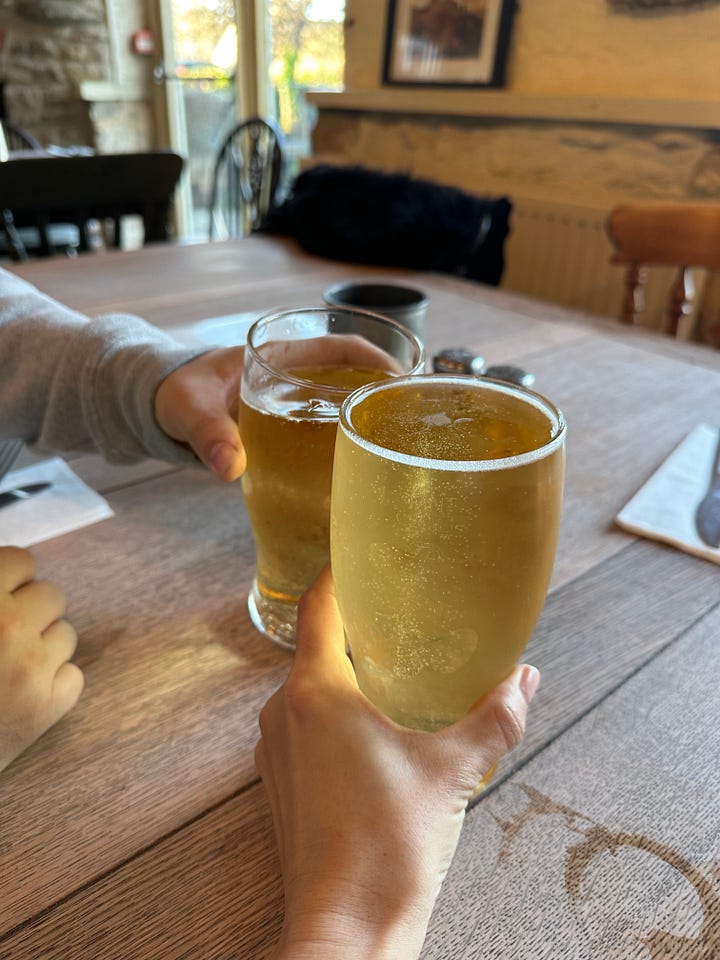The thing I have been struggling with most lately on my *language journey* is learning the differences between Standard French and Louisiana French. Not just the difference in accents, but the actual words used to describe the exact same thing. For example, the phrase: “I am hungover”.










This is a phrase that came up in my Coucou Standard French class in Manhattan, while I was deep into what I call Drinking Season (the season which starts with wedding season, zigzags through Friendsgiving and holiday/birthday parties then ends with my celebrating new years in the UK with Rick and his uni lads and asking God for mercy). See above.
This is a time that no matter how many times I tell myself I am NOT drinking tonight, a sexy, frosted-rimmed cocktail waltzes up with a reindeer straw and I cave.
No matter what, I am proud to say, I have made myself study through the hangovers that follow. Every single day. (That’s a lie, but it has been most days. Ok? Okay?!)
Through headaches and red eyes, I flip flash cards and sip black coffee and remind myself what my Standard French teacher from Avignon, France told us on our first day at Coucou: “French is 80% memorization.”
Easy enough.
I mean, hard enough in that you must stick to your study schedule consistently but facile enough in that if you follow it you know you will see progress.
“J’ai la guele de bois…,” she said one day when going over the differences between the verbs etre (to be) and avoir (to have) in French. “It means ‘I am hungover,’ but as you can see, we use the verb meaning ‘to have’ instead of ‘to be’ in this phrase. Again, this is something you’ll just have to memorize to remember!”
I immediately added it to my stack of index cards and sent an email to my Louisiana French teacher to check on differences I should note about saying that phrase in Louisiana French. A phrase I was learning at a pretty timely point in the Drinking Season. I expected a caveat in pronunciation maybe, a slight tweak in a word or two, but not this. NOT THIS:
Me: “Cher Dr. Cheramie — Comment dit-on ‘I am hungover’ en français louisianais?"
Dr. David Cheramie: “Ah, ‘je suis à soguer.’”
?!?!?!?!?!
Not only does the Louisiana French phrase use completely different words except for one (je) but it also uses a different verb. [INSERT *upside-down-forced-smile emoji*]
Times like these make me want to give up: how can I keep it all straight? Is it worth using the Louisiana French accent if no one in my Standard French class can understand me? Will I sound like a stuffy European poser when I muster up the courage to talk to my favorite Louisiana French musicians?
But then I remind myself that having two ways to describe the same thing makes that “thing” even more tangible in my mind, provides a sort of double mnemonic device to help me retain the word so that it becomes more than a word. It becomes a feeling with sounds stemmed from very real memories.
For example, the Standard French phrase, j’ai la guele de bois literally means: “I have wooden mouth”. “Guele” reminds me of Charles de Gaulle, the airport in Paris where I flew out to return home from studying abroad my junior year of college. The longest stretch of time during that 2008 summer that I didn’t have wine.
The Louisiana French phrase, je suis à soguer means effectively “I am loafing around.” Loafing around was practically a sin growing up in Louisiana. If I think “s” is for “sin” when thinking about “hangover” in Louisiana French, I remember "soguer”.
Hey, it works. At least for me.
Maybe I can do this? I just need to pace myself so that I don’t start seeing double like I did during Drinking Season. :)





Since this posting, so many of you have shared your favorite ways to say "I am hungover" in Standard French and in Louisiana French on Instagram! If we're not already friends on social, add me @megsbroussard. Here's the full list I've gathered so far:
-- "mal aux cheveux" (Canadian French)
-- "tout manière malade" (Louisiana French, lyric in Cajun song "Lemonade Song" meaning "sick in every way")
-- "crise de foie" (Standard French, meaning both "liver crisis" and "crisis of faith")